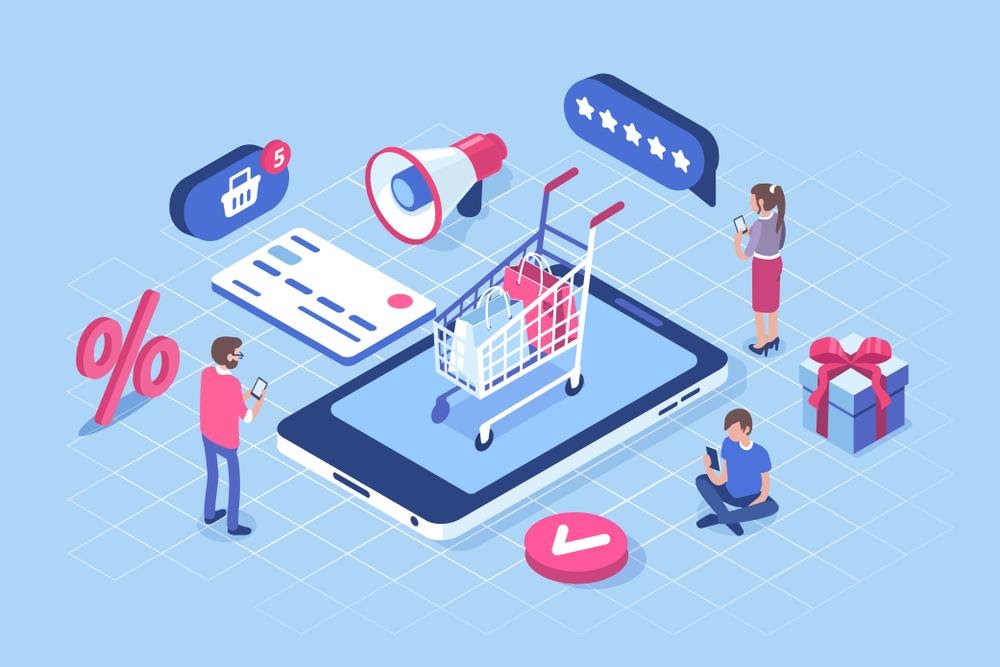Smartphones are helping us do pretty much everything these days. A concept you must be familiar with if you own one of the 275 million smartphones in use in the USA alone.?
When was the last time you banked digitally or checked out the latest promotions online? Chances are, not too long ago. Also, odds are you did this on your smartphone. That?s exactly what m-commerce is.
Simply put, M-commerce stands for all commercial transitions done digitally through smartphones. It is a subdivision of e-commerce. 53% of all online transitions are expected to be made from cellular phones in 2021. Aka, via m-commerce
M-commerce is not limited to just exchanges of services and products. Mobile bill payments, mobile money transfers, mobile banking, payments via apps, contactless payments are all forms of M-commerce.
E-tickets and bookings that you pay through your phone are also covered under this term. As are most location-based services and deliverables.

Key Differences Between E-commerce and M-commerce
E-commerce or electronic commerce means all transitions made online. M-commerce is specific to cellular phones, or tablets.
M-commerce frees the user to make transitions easily from anywhere at any time as long as they have an internet connection on their phone.
E-commerce completely revolutionized our perception of shopping and banking. But focusing on e-commerce is not enough to compete in today?s highly competitive business environment anymore.
The M-commerce market is expected to exceed 432.24 billion dollars in 2022. That?s exactly why focusing on m-commerce can define success for your brand.?
Technically, you could use the same website for both e-commerce and m-commerce. But if your aim is to deliver an enhanced customer experience, you need a custom build app for mobile phone users. This will offer easier transitions, fewer glitches, and improved navigation.
Not only for purchasing but product research on the consumer end is extendedly being carried out on cell phones as well.?
Three out of four customers say they compare products on their phone even while shopping in-store.
Hence building apps specifically to cater to this growing trend will prove to be a worthy investment.
Importance of M-commerce for Businesses
Here are some advantages you can leverage by focusing on M-commerce:
1. Access to Customer Data
Data provided by customers during sign-up on applications is a valuable resource. This data allows you to focus your marketing efforts on leads that have the greatest chances of becoming customers.
That can improve your conversion rates and save you in advertising costs.
Also, you can tailor your pitches and offers according to the preferences of each customer. Thus delivering a custom-made shopping experience.
2. Easy Access for Customers
Making shopping easier for the users translates to increased business for you. M-commerce compliments all your other stores without replacing them.
You should use it because you need to be where your customers are.
Initially, businesses went into e-Commerce because people had begun to use the internet for most things. So brands saw an opportunity, the same is the case with mobile shopping today. Leveraging this opportunity can mean an expansion of your business into new markets.
3. Much Improved User Experience
88% of customers prefer not to return to e-shops after a single negative user experience.
Applications made for m-commerce allow you to deliver a superior user experience.
You can boost features such as:
- . Home screen apps
- . Improved navigation
- . Easier check-out process.
- . Two-factor authentication.
This will make the shopping experience much safer and more effective for your shoppers.
4. Great for Marketing
With tailor-made apps, you can show notifications much more easily. Thus promoting shoppers to check out your app.
When your app is fun, interactive, and easy to scroll through, users might open it more often to scroll, much like they do with social media apps. This can increase store traffic and that can ultimately lead to more sales.
5. Faster Transactions
Apps not only offer smoother transitions for shoppers but also more payment options. Many brands now use one-time sign-ups that save users? info to further facilitate the check-out process.
Emerging m-commerce businesses should check out app developers in Huston to make these transitions safer and faster. This ease of use means more customers shopping more often.?
Your Next Steps
The success of any business is in how it adapts to changes. This flexibility translates into the eventual success or failure of any brand.
M-commerce is here to stay, and the businesses that cater to this new necessity will be the ones ahead of their competition.
As smartphones become more and more pivotal to us all, understanding the dynamics of m-commerce is crucial for any modern-day retailer to grow.
M-Commerce is not just a fad, it?s fast evolving into a new way of doing business.

As the editor of the blog, She curate insightful content that sparks curiosity and fosters learning. With a passion for storytelling and a keen eye for detail, she strive to bring diverse perspectives and engaging narratives to readers, ensuring every piece informs, inspires, and enriches.









